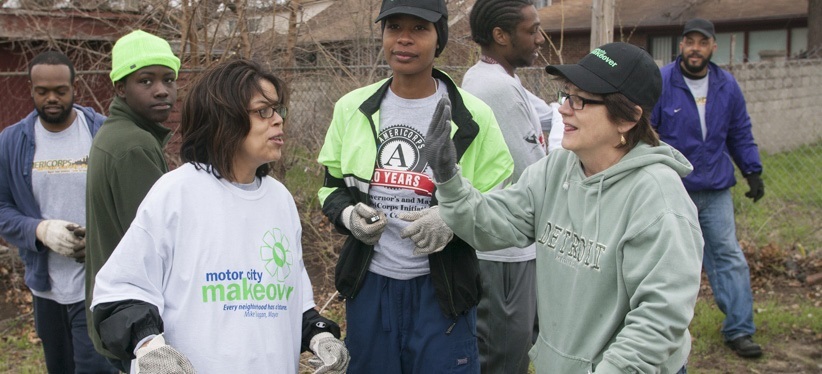How an Innovative Leadership Strategy is Transforming Detroit
In recent years, Detroit has made unprecedented progress in both reducing blight and engaging citizens in solving the city’s most entrenched problems. The secret? Appointing a Chief Service Officer as a senior leadership role within the city’s government.
What is a Chief Service Officer?
A Chief Service Officer, or a leader in a similar position, collaborates with citizen volunteers and community partners to work together toward common goals and coordinate efforts city-wide, bringing focus and shared resources to solving key problems.
Michael R. Bloomberg, three-term Mayor of New York City and founder of Cities of Service, appointed the first CSO back in 2009. Today, there are CSOs and leaders in similar roles in at least 45 cities worldwide — and growing.
Detroit Mayor Mike Duggan learned about the CSO role and its success in other cities through his work with Cities of Service, a collaborative coalition where city leaders exchange ideas and best practices. He appointed his general manager of the department of neighborhoods, Victoria Kovari, as the city’s first CSO.
A collaborative strategy for reducing blight
Kovari’s first move was to bring together partners who for ages had worked independently — often without coordinating efforts — to solve the same or highly interrelated problems.
She convened an advisory group comprised of staff at major corporations and non-profit organizations leading volunteer efforts in the city.
Together, the CSO and public and private partners created a citywide service plan with three primary goals:
- Keeping people in their homes by reducing the number of tax foreclosure properties
- Improving the financial security of working families
- Mitigating blight in neighborhoods
Rather than agree on a high-level strategy and then disband, the partners formed an advisory group called Partners in Service and committed to working together to see the strategy through, meeting monthly to share progress and troubleshoot challenges as necessary. These meetings continue, and are now a part of “business as usual.”
Kovari also asked the district managers embedded with each of the city’s seven districts to form an unofficial group of advisors. These neighborhood leaders have strong relationships with residents, businesses, clergy and communicated pressing issues while helping to vet strategies and plans.
She and her partners also launched a website, Serve Detroit, as a central place for volunteers to learn about and sign up for service projects in the city.
CSO and partners dramatically reduce foreclosures
As part of their coordinated strategy, Kovari and partners created a plan for reducing foreclosures in the city. Together they recruited volunteers for a major, door-to-door public outreach campaign.
The City identified 5,600 occupied homes at high-risk for foreclosure and launched a targeted campaign to help them stay. Volunteers provided residents with crucial information about how to avoid tax foreclosure and promoted foreclosure prevention workshops in the neighborhood.
The result? Two thirds of the homes visited as part of the outreach campaign were diverted from foreclosure, saving 3,700 families from displacement. Mayor Mike Duggan attributes much of this success to the door-to-door efforts of volunteers.
As WDET, the public radio station in Detroit, reported, one citizen whose life was transformed by this campaign is Denise Tanks. When Tanks received a letter that the house she rented was facing foreclosure, she asked her landlord about it, and was threatened with eviction. Around the same time, a volunteer from the United Community Housing Coalition — one of Kovari’s partners — knocked on Tanks’ door. Thanks to the counseling she received from this volunteer, Tanks was able to avoid being illegally evicted. She started putting rent into an escrow account, and now she is planning to bid on the house, so that she can become the homeowner herself.
Leading into the future
CSO Kovari and her partners plan to build on their success to achieve even greater results for the residents of Detroit. To support their work, they continue to put infrastructure in place, from hiring a volunteer coordinator to centralizing volunteer activities under the department of neighborhoods. In the meantime, the door-to-door outreach campaign to reduce property foreclosures and blight continues.
“Developing a citywide strategy with corporate, nonprofit, and city partners was transformative. We were able to amplify blight mitigation approaches that were already working, focus resources on the areas of greatest need, and build an infrastructure to support citizen engagement, ” said Kovari.
Learn more about the benefits Detroit has seen under the collaborative leadership of a Chief Service Officer, and about other cities that are boosting citizen engagement and solving entrenched problems thanks to similar leadership approaches.

